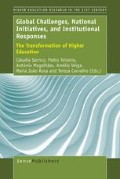Abstract
In this chapter we discuss how institutional culture of the academic system affects university’s response to global rankings pressure. Rankings as strong public measures determine the process of organizational change at the university level. At the same time, the nature and degree of change depends on whether university is driven by a market-based or state-based logic of accountability.
Access this chapter
Tax calculation will be finalised at checkout
Purchases are for personal use only
Preview
Unable to display preview. Download preview PDF.
References
Bastedo, M. N., & Bowman, A. N. (2009). Getting on the front page: Organizational reputation, status signals, and the impact of U. S. news and world report on student decisions. Research in Higher Education, 50, 415–436.
Bastedo, M. N., & Bowman, A. N. (2010). The U. S. news & world report college rankings: Modeling institutional effects on organizational reputation. American Journal of Education, 116, 163–183.
Bastedo, M. N., & Bowman, N. A. (2011). College rankings as an interorganizational dependency: Establishing the foundation for strategic and institutional accounts. Research in Higher Education, 52, 3–23.
Birnbaum, R. (1991). How colleges work: The cybernetics of academic organization and leadership. San Francisco, CA: Jossey-Bass.
Clark, B. R. (1983). The higher education system. Academic organization in cross-national perspective. Berkeley, CA: University of California Press.
Clark, S. M., Gioia, D. A., Ketchen, D., & Thomas, J. B. (2010). Transitional identity as a facilitator of organizational identity change during a merger. Administrative Science Quarterly, 55, 397–438.
Colyvas, J. A. (2012). Performance metrics as formal structures and through the lens of social mechanisms: When do they work and how do they influence? American Journal of Education, 118, 167–197.
Czarniawska, B., & Genell, K. (2002). Gone shopping? Universities on their way to the market. Scandinavian Journal of Management, 18,455–474.
Dunrong, B. (2016). Global rankings and world-class university aspirations in China. In M. Yudkevich, P. Altbach, & R. Rumbley (Eds.), The global academics rankings game. Changing institutional policy, practice and academic life. London: Routledge. (Forthcoming)
Espeland, W. N., & Sauder, M. (2007). Rankings & reactivity: How public measures recreate social worlds. American Journal of Sociology, 113, 1–40.
Friedland, R., & Alford, R. R. (1991). Bringing society back in: Symbols, practices, and institutional contradictions. In W. W. Powell & P. J. DiMaggio (Eds.), The new institutionalism in organizational analysis (pp. 232–266). Chicago, IL: University of Chicago Press.
Froumin, I. (2011). Establishing a new research university: The higher school of economics, the Russian federation. In P. G. Altbach & J. Salmi (Eds.), The road to academic excellence: The making of world-class research universities (pp. 293–321). Washington, DC: The World Bank.
Gioia, D. A., Thomas, J. B., Clark, S. M., & Chittipeddi, K. (1994). Symbolism and strategic change in academia: Dynamics of sensemaking and influence. Organization Science, 5, 363–383.
Hazelkorn E. (2007). The impact of league tables and ranking systems on higher education decision making. Higher Education Management and Policy, 19, 81–105.
Hazelkorn E. (2008). Learning to live with league tables and ranking: The experience of institutional leaders. Higher Education Policy, 21, 193–215.
Hazelkorn, E. (2011). Rankings and the reshaping of higher education: The battle for world-class excellence. Basingstoke: Palgrave Macmillan.
Hazelkorn, E., Loukkola, T., & Zhang T. (2014). Rankings in institutional strategies and processes: Impact or illusion? Brussels: European University Association. Retrieved from http://www.eua.be/Libraries/Publications_homepage_list/EUA_RISP_Publication.sflb.ashx
Locke, W. (2011). The institutionalization of rankings: Managing status anxiety in an increasingly marketized environment. In J. C. Shin, R. K. Toutkpushian, & U. Teichler (Eds.), Ranking, reputation and the quality of higher education (pp. 201–228). Dordrecht: Springer.
Martins, L. L. (2005). A model of the effects of reputational rankings on organizational change. Organizational Science, 16, 701–720.
Meyer, J. W., & Rowan B. (1977). Institutionalized organizations: Formal structure as myth and ceremony. American Journal of Sociology, 83, 340–363.
Pavlyutkin, I., & Yudkevich, M. (2016). The ranking game on the Russian battlefield: The case of the higher school of economics. In M. Yudkevich, P. Altbach, & R. Rumbley (Eds.), The global academics rankings game. Changing institutional policy, practice and academic life. London: Routledge. (Forthcoming)
Pusser, B., & Marginson, S. (2013). University rankings in critical perspective. The Journal of Higher Education, 84, 544–568.
Salmi, J. (2009). The challenge of establishing world-class universities. Washington, DC: The World Bank.
Sauder, M. (2008). Interlopers and field change: The entry of U. S. News into the field of legal education. Administrative Science Quarterly, 53, 209–234.
Sauder, M., & Espeland, W. N. (2009). The discipline of rankings: Tight coupling and organizational change. American Sociological Review, 74, 63–82.
Sterligov I., & Savina T. (2016). Riding with the metric tide: ‘Predatory’ journals in scopus. Higher Education in Russia and Beyond, 1(7), 9–12. Retrieved from https://herb.hse.ru/en/
Thornton, P., & Ocasio, W. (1999). Institutional logics and the historical contingency of power in organizations: Executive succession in the higher education publishing industry, 1958–1990. American Journal of Sociology, 105, 801–843.
Weick, K. (1976). Educational organizations as loosely coupled systems. Administrative Science Quarterly, 21, 1–19.
Weick, K. E. (1995). Sensemaking in organizations. London: Sage Publications.
Yudkevich, M., Altbach, P., & Rumbley, L. (2015, December). Global university rankings: The “Olympic Games” of higher education? Prospects, 45(4), 411–419.
Author information
Authors and Affiliations
Editor information
Editors and Affiliations
Rights and permissions
Copyright information
© 2016 Sense Publishers
About this chapter
Cite this chapter
Pavlyutkin, I., Yudkevich, M. (2016). The Impact of University Academic Culture and Leadership on the Symptoms of “Global Ranking Fever”. In: Sarrico, C., Teixeira, P., Magalhães, A., Veiga, A., Rosa, M.J., Carvalho, T. (eds) Global Challenges, National Initiatives, and Institutional Responses. Higher Education Research in the 21st Century Series. SensePublishers, Rotterdam. https://doi.org/10.1007/978-94-6300-675-0_10
Download citation
DOI: https://doi.org/10.1007/978-94-6300-675-0_10
Publisher Name: SensePublishers, Rotterdam
Online ISBN: 978-94-6300-675-0
eBook Packages: EducationEducation (R0)

